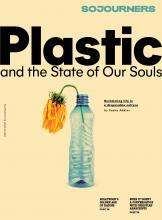Plastic and the State of Our Souls
Item
Title
Plastic and the State of Our Souls
Loyola Faculty Contributor
Sasha L. Adkins
Link
Abstract
SOMEHOW, THE CULTURAL narrative around plastics has collapsed into a story of unfortunate sea creatures with their little bellies full of plastic. As an only child who grew up living aboard a sailboat, these sea creatures are my family and the ocean is my home. I devoted my dissertation research to studying how some types of plastic marine debris concentrate methyl mercury. I crewed on a short research trip to Baja California with Capt. Charles Moore of the Algalita Marine Research Foundation, who was the first to bring attention to the Pacific “garbage patch.” I helped dissect a juvenile black-footed albatross and counted the bits of plastic in its majestic body.
I, too, feel the urgency to keep plastics out of the oceans at all costs, but I fear that there is another story that is not being told.
Disposable plastic is toxic not only to the body but also to the soul. The more we normalize short-term utility as the main criterion for evaluating the things around us, the more disconnected we become from a sense of the inherent worth of creation. The more we cultivate this habit of the heart of seeing things as disposable once they no longer serve us, the less able we are to find the beauty and value in our relationships with each other, or even the intrinsic value in ourselves once we are no longer “productive.”
I, too, feel the urgency to keep plastics out of the oceans at all costs, but I fear that there is another story that is not being told.
Disposable plastic is toxic not only to the body but also to the soul. The more we normalize short-term utility as the main criterion for evaluating the things around us, the more disconnected we become from a sense of the inherent worth of creation. The more we cultivate this habit of the heart of seeing things as disposable once they no longer serve us, the less able we are to find the beauty and value in our relationships with each other, or even the intrinsic value in ourselves once we are no longer “productive.”
Publication Title
Sojourner's Magazine
Publisher
Sojourner's Magazine
Bibliographic Citation
Adkins, S. Plastic and the State of Our Souls (February 2020). Washington, DC: Sojourner's. https://sojo.net/magazine/february-2020/poison-body-and-soul-plastics-spirituality

